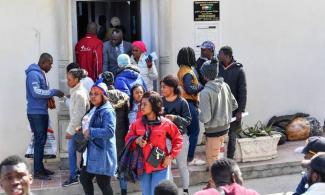
According to New York Times, Tunisia’s president declared migrants from other parts of Africa as pawns in a “criminal plot” to make his predominantly Arab and Muslim nation “a purely African country.”
Tunisia President, Kais Saied has accused migrants from other parts of Africa of fomenting crime and violence in the country.
According to New York Times, Tunisia’s president declared migrants from other parts of Africa as pawns in a “criminal plot” to make his predominantly Arab and Muslim nation “a purely African country.”
“The unspoken goal behind these successive waves of irregular migration is to consider Tunisia a purely African country, with no affiliation to the Arab and Islamic nations,” he said, accusing the migrants of fomenting crime and violence.
His remarks, seemingly inspired by a xenophobic political party that supports him, echoed the white-supremacist “great replacement” theory popular with the European and American far right, which contends that there is a secret effort to replace white populations with others.
A few days after his comments, workers and students from sub-Saharan Africa have been fired, thrown out of their homes, banned from public transportation and assaulted, according to rights groups.
Moussa Osman, a 35-year-old former car salesman supporting two children back home in violence-wracked northern Nigeria, lost his construction job after the company said it could no longer employ migrants who had come to Tunisia illegally.
Then, he said his landlord started talking about evicting him, worried he would be penalized for having migrants on the property.
On Sunday, a group of Tunisians broke into Osman’s apartment, beat up the migrants he was living with and stole their passports and cellphones. By Monday afternoon, he felt he had no choice but to risk a taxi ride to the Nigerian Embassy in Tunis, the capital, hoping to secure some thin protection from a campaign of arrests that migrant associations and Tunisian rights groups say has swept up hundreds of Black foreigners over the last month.
“I am a poor person, a poor migrant living here in peace,” he said outside the embassy, where other Nigerians had begun camping, fearing for their safety. “I left my children in a very difficult situation, and here I find myself in another critical situation.”
After seizing power in July 2021, Saied promised he had no intention of becoming a dictator. For opponents, activists and a rising number of Tunisians who were once content to wait and see if he could turn the country around, however, the spasm of arrests and increasingly corrosive words showed a leader embracing a grimmer autocracy than many had imagined possible.
“When you say something that violent in a society that is already racist, it’s playing with fire,” said Salsabil Chellali, the Tunisia director for Human Rights Watch. “The opposition, civil society, lawyers, media and now migrants — this is really a higher gear that he’s shifted into recently. The worst that we were expecting is happening.”
Though Saied’s support had already splintered thanks to a free-falling economy, the upheaval in recent days has mobilized some Tunisians who were still torn between wariness of the president and loathing of the rivals he ejected from power, whom many blame for the economic stagnation and political paralysis of the last decade.
Hundreds of people marched in support of migrants in Tunis last weekend, and several anti-Saied factions have called for a major demonstration against the president on Sunday. Among them is a powerful national trade union, known by its French initials U.G.T.T. One of the union’s officers was recently arrested because he helped organize a strike.
Tunisia’s foreign ministry has accused critics, including the African Union, the United States and France, of misinterpreting the president’s words. On Friday, Saied denied that his speech was racist, asserting that legal migrants had nothing to fear. Nevertheless, he repeated his claims about a conspiracy to effect a demographic change.
Tunisia, with a population of about 12 million, is home to an estimated 20,000 sub-Saharan Africans, many of whom crossed into Tunisia illegally for the menial jobs that Tunisians often reject. Others work or study legally.